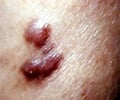UN envoy for AIDS in Eastern Europe denounced the region, and Russia in particular, for its increasingly harsh criminal prosecution of drug addicts, at a conference to prevent the spread pf AIDS.

"People are sentenced to very long prison terms, not for trafficking but for possession of very small quantities of drugs."
Kazatchkine spoke to AFP on the sidelines of the International Harm Reduction Conference in Vilnius, which is backed by the Elton John AIDS Foundation and is spotlighting health among intravenous drug users.
The group is one of the highest-risk populations for the AIDS virus, especially in central and eastern Europe and central Asia.
Kazatchkine said opiate substitution therapy is illegal in Russia and needle exchange programmes are almost nonexistent.
The former doctor denounced the justice system's harshness, fuelled by "social, cultural, religious and now economic factors".
Advertisement
"It is a vicious circle: social marginalisation increases the risk of being affected by HIV, and HIV exacerbates social marginalisation, adding another layer of stigma," he said at the opening of the four-day event on Sunday.
Advertisement
The conference is taking place in the Lithuanian capital to focus on central and eastern Europe and central Asia, an HIV hotspot with more than 3.7 million injecting drug users, almost a quarter of the worldwide tally.
According to the UN agency UNAIDS, eastern and central Europe has the fastest-growing HIV epidemic of any region in the world, with injecting drug use accounting for around three-quarters of new cases.
In Russia, some 1.5 million people are living with HIV compared to some 100,000 a decade ago.
Source-AFP















